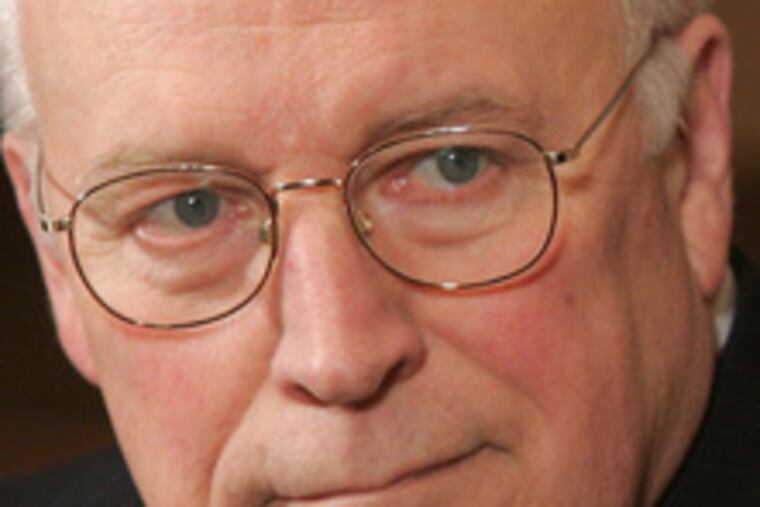Cheney is unapologetic on his tenure
WASHINGTON - Vice President Cheney offered an unabashed defense of the Bush administration's claims of broad executive powers yesterday, mocking criticism from Vice President-elect Joseph R. Biden Jr. and saying the president "doesn't have to check with anybody" before launching a nuclear attack.

WASHINGTON - Vice President Cheney offered an unabashed defense of the Bush administration's claims of broad executive powers yesterday, mocking criticism from Vice President-elect Joseph R. Biden Jr. and saying the president "doesn't have to check with anybody" before launching a nuclear attack.
In an interview with Chris Wallace on
Fox News Sunday
, Cheney fired back at Biden's contention that he was probably "the most dangerous vice president" in U.S. history. He also ridiculed Biden for mistakenly citing Article I of the U.S. Constitution, rather than Article II, in talking about executive-branch powers during an October debate.
"If he wants to diminish the office of the vice president, that's obviously his call," Cheney said of Biden. He added that President-elect Barack Obama "will decide what he wants in a vice president and apparently, from the way they're talking about it, he does not expect him to have as consequential a role as I have had during my time."
Cheney, speaking less than a month before he and President Bush leave the White House, was blunt and unapologetic about his central role in some of the most controversial issues of the last eight years, including the invasion of Iraq, warrantless surveillance of U.S. citizens, and harsh interrogation tactics. Cheney also said he disagreed with Bush's decision to remove embattled Defense Secretary Donald H. Rumsfeld in 2006, saying that "the president doesn't always take my advice."
"I was a Rumsfeld man," Cheney said. "I'd helped recruit him, and I thought he did a good job for us."
The interview was the second in less than a week for the normally reclusive vice president, and it comes as part of a broad effort by Bush and his aides to focus attention on issues that they consider major accomplishments of their two terms in office. In an interview with ABC News last week, Cheney suggested the administration would have gone to war with Iraq even without erroneous intelligence showing that Saddam Hussein had developed weapons of mass destruction. Cheney also said in that interview that he approved of the administration's use of coercive interrogation tactics, including a type of simulated drowning known as waterboarding, against Khalid Shaikh Mohammed, the alleged mastermind of the 9/11 attacks, and others.
Elisa Massimino, executive director of Human Rights First, said in a statement that Cheney "persists in defending these disgraceful policies of abuse which have been rejected by senior retired military leaders and experienced interrogators as ineffective and counterproductive."
Obama has criticized the Bush administration for condoning torture and has pledged to end interrogation practices barred under international law.
But Cheney expressed no regrets in yesterday's interview, vigorously defending the Bush administration's war and counterterrorism policies and saying he was untroubled by opinion polls showing that he and Bush are among the most unpopular White House occupants in modern times. "Eventually you wear out your welcome in this business, but I'm very comfortable with where we are and what we've achieved substantively," he said.
In discussing his views of broad executive power on national security issues, Cheney said that Abraham Lincoln and Franklin D. Roosevelt "went far beyond anything we've done in a global war on terror," and said that all U.S. presidents since 1973 have viewed the War Powers Act - which gave Congress the role of declaring war - as unconstitutional. He noted that the president is accompanied at all times by a military aide carrying the nuclear "football" allowing the launching of nuclear strikes.
"He could launch the kind of devastating attack the world has never seen," Cheney said. "He doesn't have to check with anybody. He doesn't have to call the Congress; he doesn't have to check with the courts. He has that authority because of the nature of the world we live in. It's unfortunate, but I think we're perfectly appropriate to take the steps we have."